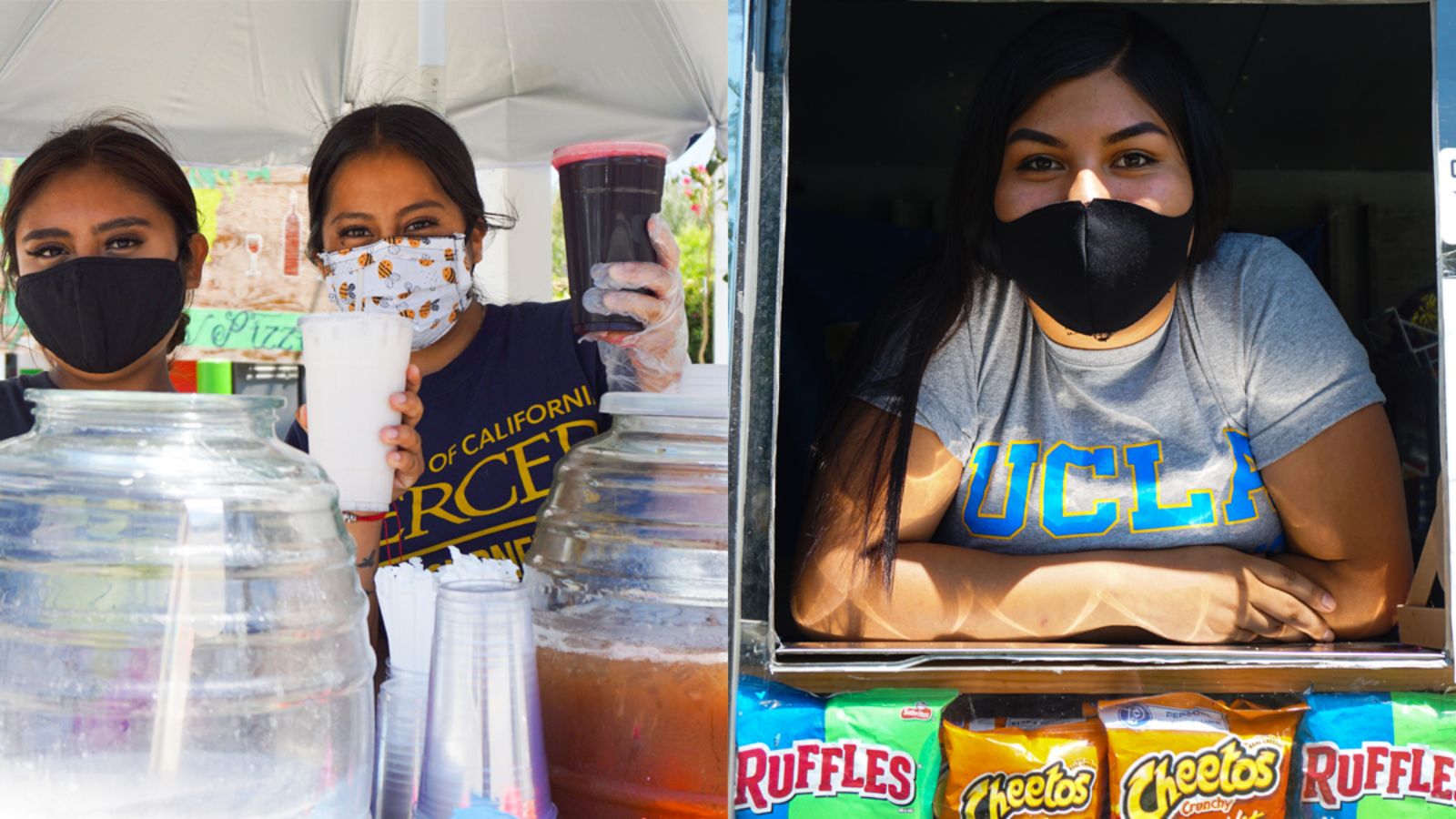[dropcap size=big]W[/dropcap]hen people think of street vendors, they often picture older señoras or señores selling elotes, churros, and ice cream down their block. And although that is often the case, during this pandemic as jobs continue to lay off employees, younger generations are deciding to join the street vending business.
In particular, high school and college students.
First-generation students like 18-year-old Lyzeth Garcia from Montebello began selling paletas with her mom in early July. This, after getting the news that she had been accepted into her dream school, UCLA.
“UCLA was always my first choice, I’ve always wanted to go there, and I think it was instilled in me early on, my closet is full of UCLA merch thanks to my dad,” said Garcia.
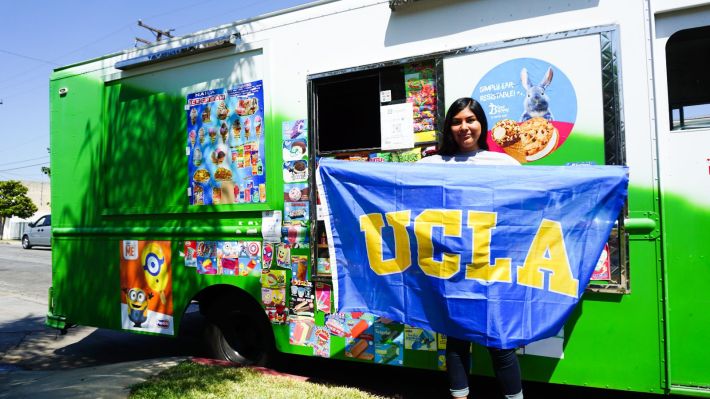
Her father Raul Garcia is a self-employed handyman from Puebla, Mexico who would pick up scrap metal in his truck around the UCLA campus and nearby neighborhoods. Every now and then while collecting metal he would come across UCLA T-shirts that were thrown away by local fraternities. Whenever this happened, he would bring them to his daughter as a subtle reminder that she was capable of getting into any school she put her mind into.
“I told my sister I would rather people donate to a bigger cause because I felt like I was good you know? I'll figure things out for my tuition, as long as I'm working, I know I'll be fine,” said Garcia. The idea to create the GoFundMe page for [other] street vendors came when they themselves were looking into permits.
But like many first-gen college students after the excitement and celebration of getting accepted into their dream university is processed, then comes the brainstorming. How were she and her family going to pay for tuition?
“Since everything is online now, tuition has been higher too so that's something that is a concern to a lot of us students,” Garcia said.
A month before getting her e-acceptance letter filled with virtual confetti, Garcia’s father was working in Beverly Hills when a cop pulled him over. According to her, the police took his truck that night leaving him jobless. “They took away his truck and his truck was basically his job, that's what he used to bring in money,” she said.
With her father losing his job and having no luck in obtaining a new one, and with her Postmates job not bringing in enough money, her mom and her decided to sell paletas. Money raised would go towards her UCLA tuition. Her mother Patrica Garcia is no stranger to the paleta-selling business. Back in 1999, she sold ice cream in East L.A. up until 2010 when she retired her ice cream truck. Memories Garcia vaguely remembers. “I just remember the hot summer days,” Garcia said. “My mom didn't want us to overheat in the truck so she would literally take these cubetas (buckets) and put them in the back of the truck and fill them with water and we would just spend our day jugando (playing) in the water.”
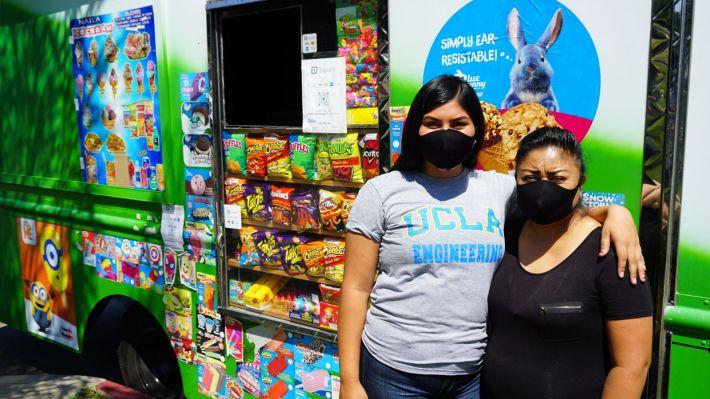
Fast forward to now and she is back in an ice cream truck like when she was little, only this time she’s the one selling the ice cream and the chucherías (nicknacks) of your childhood dreams. Her mom and her drive around Montebello in their truck named “Nalia’s Ice Cream” from 2:30 PM to 9 PM all week long. They sell a variety of items from paletas de sandia, banana splits, and of course, they sell the ‘hood classics like Flamin’ Hot Cheetos con queso and who can forget the now-iconic Tweety Bird paleta. You know, the one where the gumball eyes never really match up?

To their surprise in the last month or so, Garcia has gained a following on social media after her sister shared a photo of her with a caption that explained why she was selling ice cream. “We didn't expect all the support, but we are very thankful for it, ever since the photo was posted we haven't gone back to Postmates and it's just been going good for us so far,” she said.
For a traditional street vendor selling out of a cart, a permit can cost upwards of $772 for unpackaged goods. For ice cream trucks it can go as high as $905 according to LA Public Health.
People began to reach out to them to see if they could donate money to go towards her tuition, but Garcia had something better in mind. Instead her sister Marz and she decided to create a GoFundMe where people could donate money. But the money would not go to her, it would go to other street vendors. That’s right, money raised would be given to street vendors to pay for their permits or citations that they may have received from police while selling their products.
“Like I told my sister I would rather people donate to a bigger cause because I felt like I was good you know? I'll figure things out for my tuition, as long as I'm working, I know I'll be fine,” said Garcia. The idea to create the GoFundMe page for street vendors came when they themselves were looking into permits. They realized how expensive it can be to get a permit and realized that not all vendors can afford to pay for them.
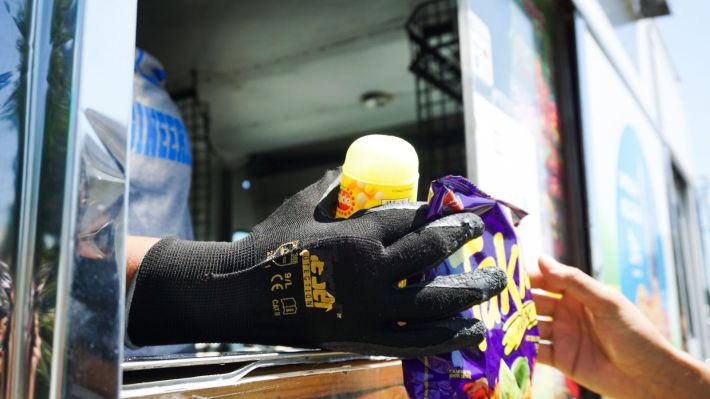
In Los Angeles permit prices vary when it comes to packaged and unpackaged foods.
For a traditional street vendor selling out of a cart, a permit can cost upwards of $772 for unpackaged goods. For ice cream trucks it can go as high as $905 according to LA Public Health. And this does not include any products or supplies that they purchase along the way.
Realizing street-vending isn't an easy task, they decided to help others and encouraged people to share their GoFundMe link with other street vendors who may need help. To her, selling ice cream is nothing out of the ordinary.
“We all have the capability to do anything we want, and yes we don't always have the means for it but we gotta work hard, so to us this is just what you do,” Garcia said.
Aguas Frescas to Get By
Like Garcia, Culver City residents Alexandra Gutierrez and Kelly Vasconcelos are also working hard for what they want. The two childhood friends decided in early June to start an aguas frescas stand to raise money for their tuition and school supplies.
“We decided to sell aguas frescas since it’s summer and it’s super hot, we thought who doesn't like aguas frescas on a hot day?” said Vasconcelos.
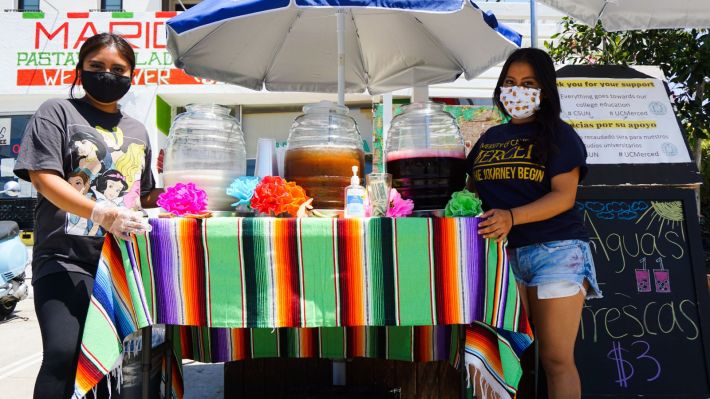
Gutierrez, 20, is attending California State University, Northridge while Vasconcelos, 18, attends The University of California Merced. With the pandemic leaving them with extra time in their hands and after Gutierrez laid off from her job as a makeup artist, they needed to find a new way to make money.
Vasconcelos said the person who inspired them to create their own stand was her dad, Marcos.
Her father, who is from Oaxaca, Mexico began selling tortas in the street way before owning his own restaurant.
Her father, who is from Oaxaca, Mexico began selling tortas in the street way before owning his own restaurant. His restaurant Mario’s Pizza is located between Inglewood Boulevard and Culver Boulevard in Culver City. When the two friends told Vasconcelos' father about their stand, he offered them the location in front of his restaurant.
“Thanks to her dad we have a safe space to set up our table and sell our aguas,” said Gutierrez.
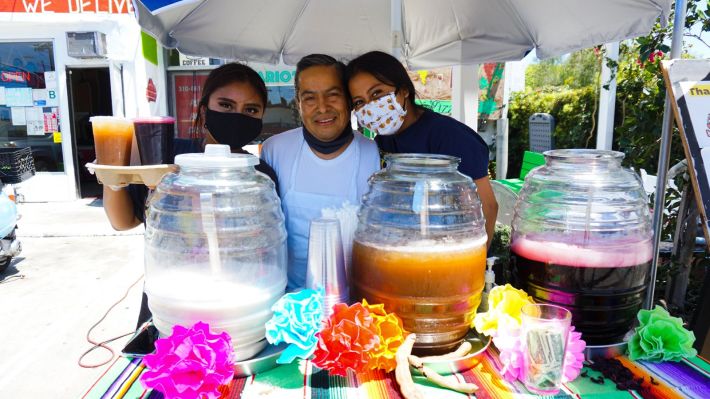
And their aguas frescas which include, horchata, tamarindo, and jamaica have become fairly popular in the area. But people don't just get an agua when they visit their stand, they get a whole show. The two friends have been dubbed “Las Chicas Locas” why? Because they blast their music and dance as a way to encourage people to try their aguas. “Our customers love our energy and what we enjoy most is that we get to dance and socialize with other people, we really enjoy every bit of it,” said Vasconcelos.
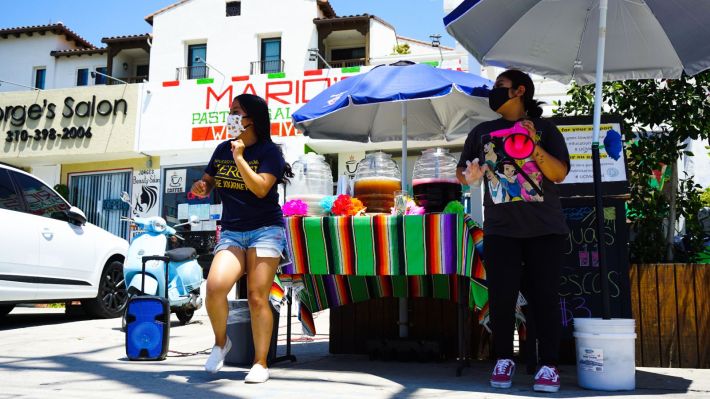
Their workday begins the night before when they prepare the frutas and soak the jamaica and tamarindo flesh in water. The next day by 10 AM, they’re either dropped off or take the bus to Mario’s Pizza where they begin to prepare the batches of aguas. By 11 a.m. they begin selling and usually go until 3:30 p.m. latest 5 p.m.
The two often use TikTok to promote their aguas and to show their interactions with customers on the app.
@kellyandalex One of our regulars!! Aguas frescas with a side of good vibes🔥 #aguasfrescas #losangeles #smallbusiness #supportlocalbusiness #streetvendors
♬ Oye Mi Amor - Maná
In the last two months, they have grown their business and the support from locals has been overall positive according to Gutierrez and Vasconcelos. And working as street vendors has only made them appreciate other vendors around them.
“We have a better insight as to what they experience, when we see street vendors, we make sure to buy from them and support them too,” Gutierrez said. “Because we know what it's like for people to pass by us and not buy anything.”
“This is our job and we are not ashamed of it; we are working hard for our education.”
Although being their own boss has had its perks, they say street vending is not easy. Even more when people approach vendors with rude comments.
Something they both have experienced.
The two friends have received comments like, “Get a real job this isn't a job” or “aren't you embarrassed of yourself?” Comments that thankfully have never turned physical like in recent instances with other vendors in L.A. “For me, it was really hard at the beginning because the comments did get to me, but then I was like, ‘No, this is our job and we are not ashamed of it; we are working hard for our education,’” said Vasconcelos.
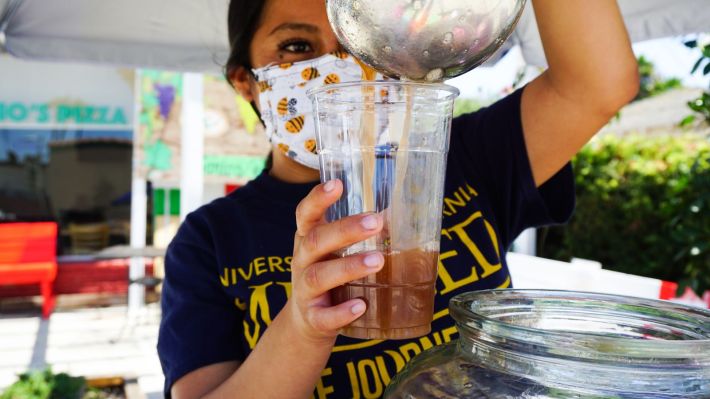
To both of them, the good comments and friendly interactions with customers are more important than any negative comments they may receive. They have also managed to inspire those around them including some of their regular customers.
Sebastian Sevilla who found Kelly and Alex’s Aguas as he was riding his bike said what they are doing is a good thing. In his eyes, he sees it as the younger generation keeping street vending culture alive while still paying respect to older vendors. To him, it also shows how hard students are willing to work when pursuing higher education.
“People should always have compassion for street vendors and if people happen to come across someone who speaks bad about street vendors, speak up and educate them.”
“I think it’s really good because you can't always just wait for something to come around to you, sometimes you just gotta go out there and start doing what you gotta do,” Sevilla said. “Because ain't nobody gonna come and give you what you need when you need it, so they are setting a good example.”
And they are, Garcia, Gutierrez, and Vasconcelos are all setting an example for anyone who wants to pursue their dreams, whether that be higher education or starting your own business.
Most importantly they are doing it with older vendors in mind.
“People should always have compassion for street vendors and if people happen to come across someone who speaks bad about street vendors, speak up and educate them,” Garcia said. “Whether they are young street vendors or older ones, we all deserve respect because we are all working towards something bigger.”
